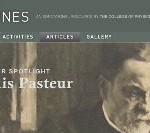April 2016

Cesarean sections in Brazil correspond to 84% of the deliveries in the private health system. Photo: wikicommons.
The article Cesarean sections, perfecting the technique and standardizing the practice: an analysis of the book Obstetrícia, by Jorge de Rezende discusses the development of techniques for cesarean sections by doctors in Brazil, during the 20th century.
This study is written by Andreza Rodrigues Nakano, Claudia Bonan – both researchers of the National Institute of Women, Children and Adolescents Health Fernandes Figueira (IFF / Fiocruz) – and Luiz Antônio Teixeira (Fiocruz).
Analising the book Obstetrícia, by Jorge Rezende, the article discusses the normalization of the practice of cesarean sections which established the procedure as the best way of give birth, excluding unpredictability, and dangers associated with the physiology of childbirth. The obstetrician Jorge Rezende was a major contributor to the improvements in cesarean section techniques. 
Cesarean sections have become an essential part of obstetric care and helped to drastically reduce rates of maternal and neonatal mortality. However, according to analysts, the indiscriminate use of this procedure has been shown to be harmful for the health of women and their babies.
This issue is specially important in Brazil. The technique has been the subject of controversies as it has currently became the main way of giving birth in the country. It corresponds to 55% of total deliveries in the country, 84.6% of the deliveries in in private health services and 40% in the public health system.
Read more in HCS-Manguinhos:
Chávez, Ana María Medina. Contexto social del debate sobre el control natal en Colombia en las décadas de 1960 y 1970: política, medicina y sociedad. Hist. cienc. saude-Manguinhos, Dic 2014, vol.21, no.4, p.1467-1473. ISSN 0104-5970
Chazan, Lilian Krakowski and Faro, Livi F.T. ““Holy scan” or “picture of the baby?” Biomedicalization and stratification in the use of obstetric ultrasound in Rio de Janeiro. Hist. cienc. saude-Manguinhos, Mar 2016, vol.23, no.1, p.57-78. ISSN 0104-5970
Felitti, Karina. Parirás sin dolor: poder médico, género y política en las nuevas formas de atención del parto en la Argentina (1960-1980). Hist. cienc. saude-Manguinhos, Dic 2011, vol.18, suppl.1, p.113-129. ISSN 0104-5970
Read the full issue of HCSMS’ latest issue: The Biomedicalization of Brazilian Bodies: Anthropological Perspectives (vol.23 no.1 Rio de Janeiro Jan./Mar. 2016).








